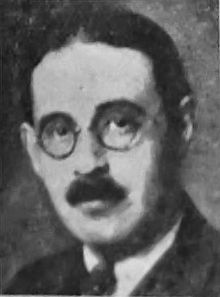Harold Laski
| Harold Laski | |
|---|---|
 |
|
| Born | Harold Joseph Laski 30 June 1893 Manchester, UK |
| Died | 24 March 1950 (aged 56) London, UK |
| Nationality | British |
| Fields | Political science, political philosophy, political economy, jurisprudence |
| Institutions | London School of Economics |
| Alma mater | New College, Oxford |
| Notable students |
V. K. Krishna Menon, Joseph P. Kennedy, Jr., K. R. Narayanan, Pierre Trudeau |
| Influenced | Robert Dahl |
Harold Joseph Laski (30 June 1893 – 24 March 1950) was a British political theorist, economist, author, and lecturer. He was active in politics and served as the chairman of the British Labour Party during 1945–1946, and was a professor at the London School of Economics from 1926 to 1950. He first promoted pluralism, emphasising the importance of local voluntary communities such as labour unions. After 1930 he shifted to a Marxist emphasis on class conflict and the need for a workers' revolution, which he hinted might be violent. Laski's position angered Labour leaders who promised a nonviolent democratic transformation. Laski's position on democracy came under further attack from Winston Churchill in the 1945 general election, and the Labour party had to disavow Laski, its chairman.
Laski was Britain's most influential intellectual spokesman for Socialism in the interwar years. Particularly, his teaching greatly influenced men such as Jawaharlal Nehru who later became leaders of new nations in Asia and Africa as the British Empire was dissolved. He was perhaps the most influential intellectual in the Labour Party, especially for those on the left who shared his trust and hope in Stalin's Soviet Union. He was distrusted by the Labour politicians who were in charge, such as Prime Minister Clement Attlee, and was never given a major government position or a peerage. With a keen commitment to human liberty and equality for the working classes, he never resolved the tension between his support for liberalism and Socialism. The tension left him increasingly pessimistic about the future of democracy.
Harold Laski was born in Manchester on 30 June 1893 to Nathan Laski and Sarah Laski (born Frankenstein). He had a disabled sister named Mabel. His elder brother was Neville Laski while a cousin was the founder of the Royal Court Theatre and father of the author and publisher Anthony Blond. Nathan Laski was a Jewish cotton merchant and a leader of the Liberal Party.
...
Wikipedia
